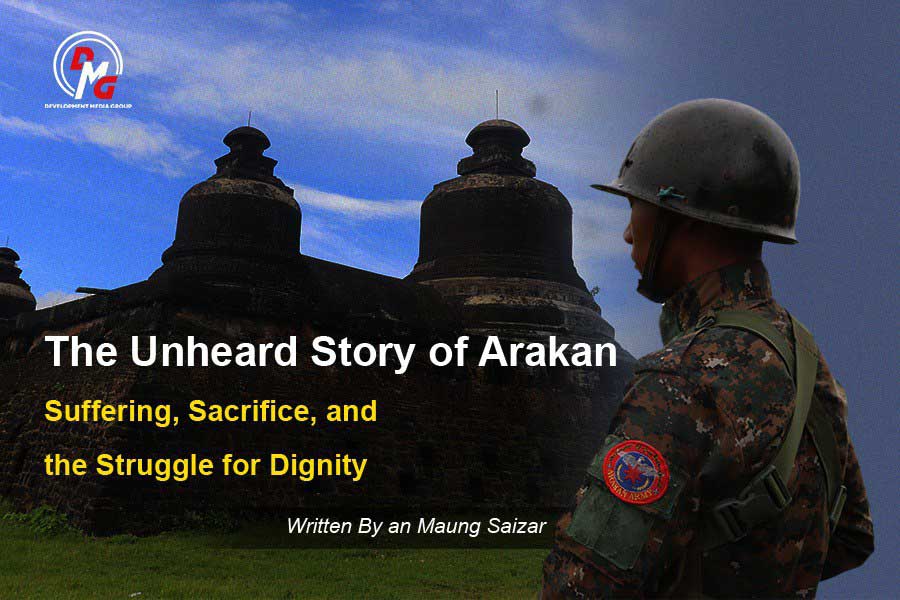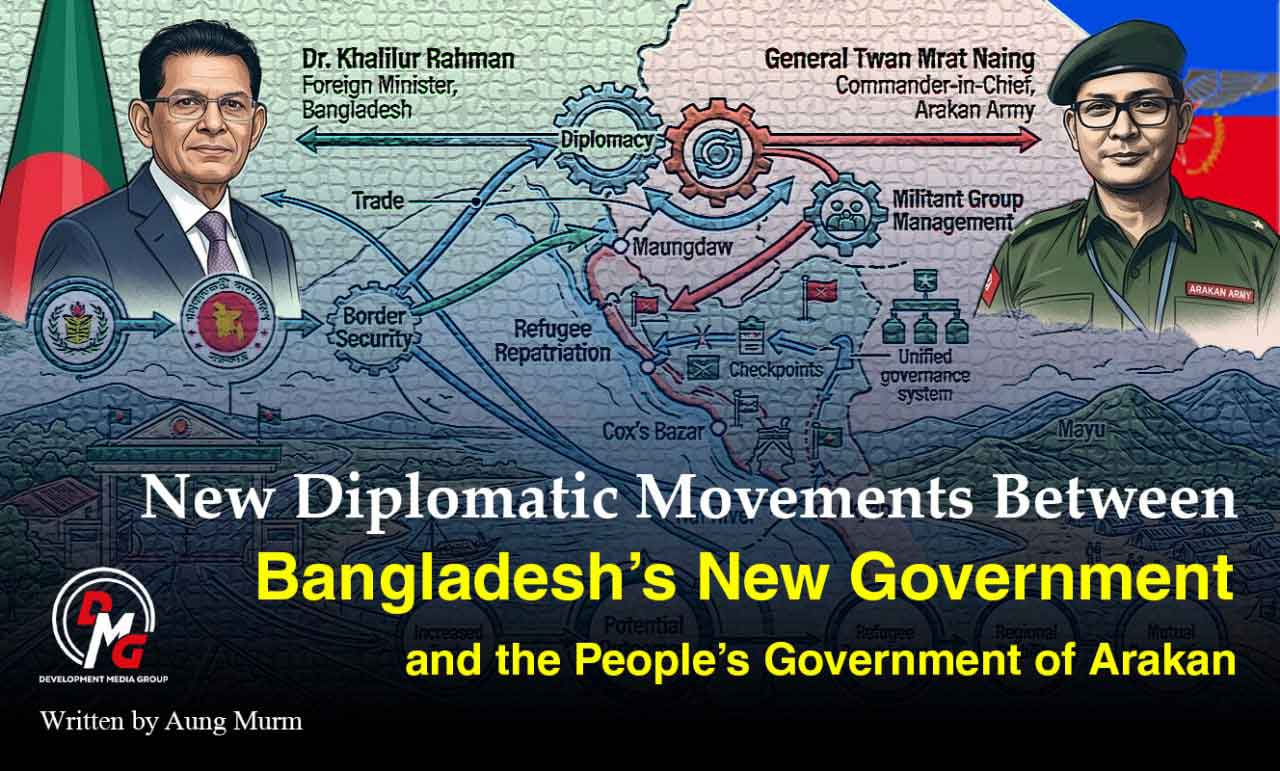- Junta launches major offensive to retake strategic Mawchi mining town
- Extreme poverty drives Sittwe residents to dismantle abandoned houses for income
- Weekly Highlights from Arakan (Feb 23 to March 1, 2026)
- Over 300 political prisoners freed from 10 prisons nationwide
- DMG Editorial: Between War and Opportunity - A New Border Reality for Bangladesh and Arakan
The Unheard Story of Arakan: Suffering, Sacrifice, and the Struggle for Dignity
For centuries, the story of Arakan has been told by others - by conquerors, colonial officers, and central rulers who saw our land as a periphery and our people as subjects. But the true story of Arakan (Rakhine) is not one of rebellion or violence; it is a story of endurance. It is the story of a people who have suffered in silence and still found the strength to rise, to organize, and to dream again.
19 Oct 2025

Written By an Arakanese Historian
For centuries, the story of Arakan has been told by others - by conquerors, colonial officers, and central rulers who saw our land as a periphery and our people as subjects. But the true story of Arakan (Rakhine) is not one of rebellion or violence; it is a story of endurance. It is the story of a people who have suffered in silence and still found the strength to rise, to organize, and to dream again.
The long shadow of neglect
Our tragedy began long before any modern conflict. In 1784, the Arakan Kingdom of Mrauk-U - a proud and flourishing civilization - fell to the Burmese Konbaung dynasty. Temples were desecrated, families were deported, and our sacred images were carried away as trophies.
The British colonization that followed replaced royal domination with economic exploitation. When independence came in 1948, Arakan found itself absorbed into a new Burmese state that continued the same old centralization, only now under the name of nationalism.
For decades, Arakan was left behind - its roads unpaved, its youth unemployed, its culture ignored. Government projects bypassed our towns; even our natural resources benefited outsiders more than locals.
The military regimes treated Arakan/Arakanese as a security zone rather than a community of human beings. Villages were raided, land confiscated, young men arrested under suspicion of "insurgency." In such a climate, bitterness was not born out of hatred but out of humiliation.
The birth of the Arakan Army
It was from this long, unending pain that the Arakan Army (AA) was born in 2009. It did not arise from ambition or ideology alone, but from a shared sense that Arakan people had no future unless they stood up for themselves.
The founders of the AA were not warlords; they were sons of original citizens, farmers and fishermen who grew tired of kneeling. They trained far from home, under harsh conditions in the northern mountains, often with little food or medicine. Many never returned. But those who did carried something more powerful than weapons - they carried the conviction that Arakan must never again live in humiliation.
By 2015, the AA's name had begun to spread. To the government, it was a threat. To the Arakanese people, it was a symbol of pride. For the first time in living memory, an Arakanese organization spoke boldly of equality, dignity, and self-determination.
Villagers who once felt invisible began to feel seen. Mothers who had lost sons to the Tatmadaw now saw their younger children walk proudly under the Arakanese flag. In their eyes, the AA was not a rebel army; it was a restoration of lost honor.
Why the world misunderstands us
The world often looks at Arakan through headlines - violence, fighting, displacement. What it does not see is the depth of our collective wound. When international organizations speak only of human rights violations and not of the decades of suffering that shaped this movement, they miss the moral essence of the story. The AA did not emerge in a vacuum. It is the natural response of a people pushed to the edge of despair.
It is easy for distant observers to say "non-state actors must follow human rights." Of course, that principle is right and necessary. But those same observers rarely mention the structural violence that created the conflict in the first place - the economic exploitation, the decades of military occupation, and the silence of the world when Arakan villages were burned long before the AA ever existed.
Arakanese people fought not for dominance, but for dignity. That distinction is crucial. We do not seek to conquer others, only to reclaim a place where we can breathe freely, teach our language, and live without fear.
A people rising from sorrow
When the AA says it wants to build an administration based on "good governance" and "moral order," it is not rhetoric. In many towns where the AA has influence, disputes are settled fairly, corruption is minimal, and ordinary people feel safer than before. Schools reopen, roads are repaired, and cultural festivals flourish again.
These may seem small things to outsiders, but to us - a people long denied agency - they are miracles of self-reliance.
Of course, there are difficulties. Any movement born in war faces misunderstanding and hardship. But hardship is the language Arakan people know best. We have been punished for simply demanding to be treated as equals; yet even in the midst of poverty, our people continue to give food, shelter, and trust to the young men and women of the AA who defend them. That is not fear - that is faith.
Our moral compass
As a historian, I see the AA not merely as an army but as an awakening. It represents the spiritual rebirth of a people once convinced that history had forgotten them. Yet power, even justly earned, must be guided by wisdom. The Arakan struggle should never lose its humanity. Our true enemy has never been another community, but injustice itself.
The people of Arakan know too well what it means to be dehumanized. Therefore, we must ensure that our pursuit of justice never repeats the mistakes of those who oppressed us. Dignity cannot be built upon another's humiliation. The greatness of a liberation movement lies not only in how fiercely it fights, but in how fairly it governs.
Recognition long overdue
The international community must learn to listen before it judges. It must understand that Arakan's yearning for autonomy is not extremism but survival. It must see that the AA's rise is not the cause of instability - it is the result of decades of broken promises and central arrogance.
When the Tatmadaw monopolized power, the world criticized but still engaged. Yet when a local movement rooted in popular support rises to claim self-rule, the world reacts with suspicion. This double standard wounds us deeply.
If the world truly desires peace in Arakan, it must respect the Arakan people's agency. It must talk to us, not about us. It must see the AA not as a problem to be solved, but as a political reality - a product of legitimate grievance and genuine sacrifice.
A legacy of endurance
The Arakan Army's story is not just about guns and uniforms. It is about the fisherman who gives his last bowl of rice to a soldier, the mother who prays for her son's safe return, and the teacher who tells children that the Arakan language will live again. It is about a people who refused to vanish, who carried the flame of pride through centuries of darkness.
When future historians write about this era, they should not see only battles and accusations. They should see a people reclaiming their voice after centuries of silence. They should see the AA as the living expression of Arakan resilience - a reminder that even the most oppressed can rise with discipline, organization, and moral conviction.
The dignity of endurance
Arakan's journey is one of immense suffering and extraordinary courage. Our people have endured conquest, poverty, and decades of humiliation, yet they have produced a movement rooted in loyalty, discipline, and hope. The Arakan Army stands as the embodiment of that hope - not perfect, but profoundly human.
The world may not understand our pain, but it should at least recognize our perseverance. For the Arakan, the struggle has never been about vengeance; it has always been about dignity - the right to live as equals on our own land.
History may judge us by the power we wield, but it should also remember the suffering that made us strong. And if the world cannot yet see that, we will keep walking forward - with discipline, with compassion, and with the quiet pride of a people who have finally stood up after centuries on their knees.








.jpg)











